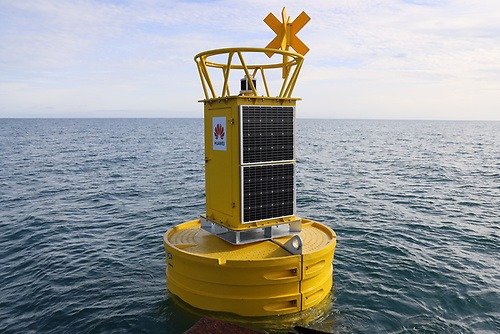Jubail, Saudi Arabia, has introduced the region’s first smart buoy for marine protection, a great example of how smart tech is enhancing services across the MENA region.
From environmental monitoring to smarter infrastructure, the region is embracing innovations that make everyday life more efficient and sustainable.
Let’s explore what makes this buoy stand out and take a look at other smart services that are changing the game across the region!
1. Jubail’s Smart Buoy
Jubail’s first smart buoy is a big leap for marine monitoring. A buoy, for those unfamiliar, is a floating device that collects data from the water. This one is solar-powered and packed with sensors that measure things like temperature, salinity, and oxygen levels.
It also sends real-time data wirelessly, making it easier for authorities to spot environmental threats. In areas like Jubail, where busy ports mean heavy maritime traffic, these buoys are crucial for quickly detecting pollutants and protecting the marine ecosystem.
2. Dubai’s Smart Irrigation Systems
Dubai Creek Golf & Yacht Club has taken irrigation to the next level with its smart watering system that conserves water while keeping the course lush. The service uses real-time data to monitor weather and soil conditions, adjusting water levels as needed.
With over 3,000 sprinklers and a cutting-edge computer system, it targets water exactly where it’s needed, reducing waste. This upgrade will save 30 million liters of water annually, making it a major step toward sustainability in a desert climate.
3. Abu Dhabi’s AI Traffic Management
Abu Dhabi is using AI to make your drive smoother. Through projects like Project Green Light, AI analyzes traffic at intersections and optimizes signal timings to reduce congestion.
The system can even predict traffic jams before they happen and adjust lights accordingly, saving time and cutting down on emissions. By using real-time data from sources like Google Maps, Abu Dhabi is ahead of the curve in managing traffic and minimizing delays.
4. Qatar’s Smart Ports
Qatar’s smart ports are taking a leap forward with IoT-powered smart tech. By using sensors and advanced data analytics, ports can track everything from cargo status to container locations in real time.
This means faster operations, less downtime, and a smoother flow of goods. With the help of AI, blockchain, and 5G, Qatar’s ports are becoming more efficient, safe, and environmentally friendly. It’s a game-changer for shipping, cutting costs, and making logistics greener.
5. Kuwait’s Smart Lighting Overhaul


Kuwait is giving Arabian Gulf Street a major glow-up with a smart lighting project that’s both stylish and sustainable. The Ministry of Electricity is rolling out decorative street poles fitted with energy-efficient LED spotlights, designed by local engineers to reflect Kuwaiti heritage.
Set to cut energy use by up to 60%, the two-year project kicked off in 2023 and is moving fast, with the first poles already installed near the Ministry of Oil. It’s part of a bigger push to upgrade lighting across new neighborhoods and reduce power waste nationwide.
From Buoys to Buses: A Smarter Future Is Already Here
From marine protection in Jubail to AI traffic management in Abu Dhabi, smart technology is making life in the MENA region more efficient, sustainable, and connected. Whether it’s managing resources better, cutting down on waste, or improving services, these smart upgrades are shaping the future. The region is embracing innovation in every corner, and the best part is we’re just getting started!
WE ALSO SAID: Don’t Miss…From Exploring Mars to Building Smart Cities: The UAE’s Most Ambitious Futuristic Projects



